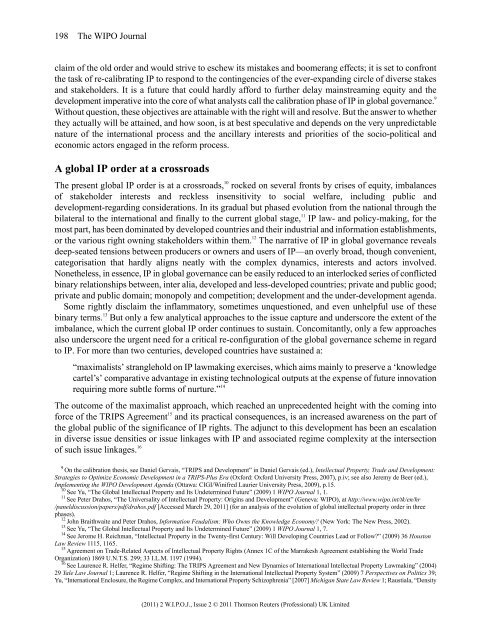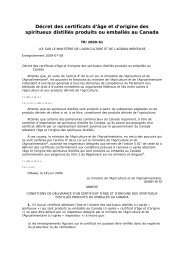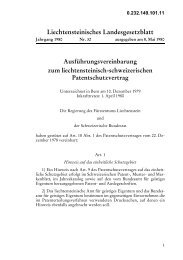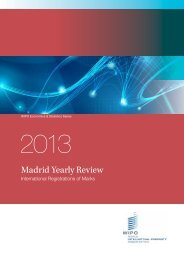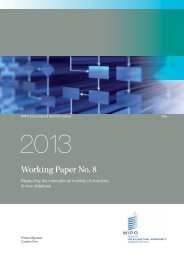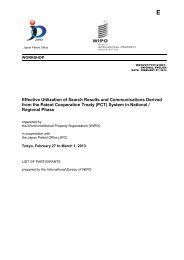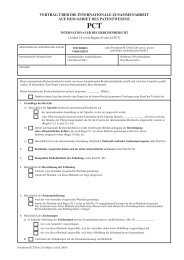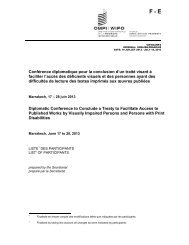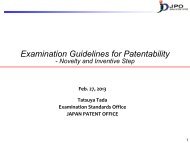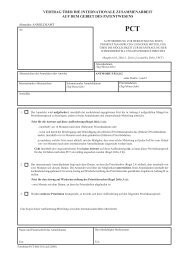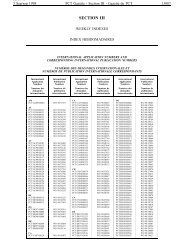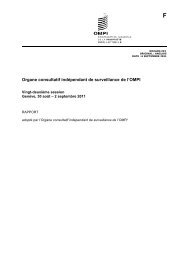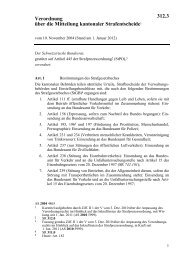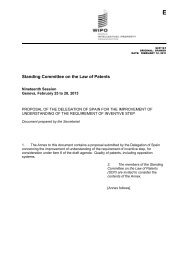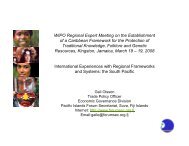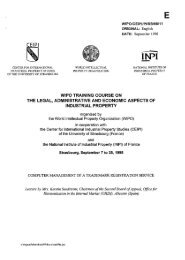WIPO Journal - World Intellectual Property Organization
WIPO Journal - World Intellectual Property Organization
WIPO Journal - World Intellectual Property Organization
Create successful ePaper yourself
Turn your PDF publications into a flip-book with our unique Google optimized e-Paper software.
198 The <strong>WIPO</strong> <strong>Journal</strong><br />
claim of the old order and would strive to eschew its mistakes and boomerang effects; it is set to confront<br />
the task of re-calibrating IP to respond to the contingencies of the ever-expanding circle of diverse stakes<br />
and stakeholders. It is a future that could hardly afford to further delay mainstreaming equity and the<br />
development imperative into the core of what analysts call the calibration phase of IP in global governance. 9<br />
Without question, these objectives are attainable with the right will and resolve. But the answer to whether<br />
they actually will be attained, and how soon, is at best speculative and depends on the very unpredictable<br />
nature of the international process and the ancillary interests and priorities of the socio-political and<br />
economic actors engaged in the reform process.<br />
A global IP order at a crossroads<br />
The present global IP order is at a crossroads, 10 rocked on several fronts by crises of equity, imbalances<br />
of stakeholder interests and reckless insensitivity to social welfare, including public and<br />
development-regarding considerations. In its gradual but phased evolution from the national through the<br />
bilateral to the international and finally to the current global stage, 11 IP law- and policy-making, for the<br />
most part, has been dominated by developed countries and their industrial and information establishments,<br />
or the various right owning stakeholders within them. 12 The narrative of IP in global governance reveals<br />
deep-seated tensions between producers or owners and users of IP—an overly broad, though convenient,<br />
categorisation that hardly aligns neatly with the complex dynamics, interests and actors involved.<br />
Nonetheless, in essence, IP in global governance can be easily reduced to an interlocked series of conflicted<br />
binary relationships between, inter alia, developed and less-developed countries; private and public good;<br />
private and public domain; monopoly and competition; development and the under-development agenda.<br />
Some rightly disclaim the inflammatory, sometimes unquestioned, and even unhelpful use of these<br />
binary terms. 13 But only a few analytical approaches to the issue capture and underscore the extent of the<br />
imbalance, which the current global IP order continues to sustain. Concomitantly, only a few approaches<br />
also underscore the urgent need for a critical re-configuration of the global governance scheme in regard<br />
to IP. For more than two centuries, developed countries have sustained a:<br />
“maximalists’ stranglehold on IP lawmaking exercises, which aims mainly to preserve a ‘knowledge<br />
cartel’s’ comparative advantage in existing technological outputs at the expense of future innovation<br />
requiring more subtle forms of nurture.” 14<br />
The outcome of the maximalist approach, which reached an unprecedented height with the coming into<br />
force of the TRIPS Agreement 15 and its practical consequences, is an increased awareness on the part of<br />
the global public of the significance of IP rights. The adjunct to this development has been an escalation<br />
in diverse issue densities or issue linkages with IP and associated regime complexity at the intersection<br />
of such issue linkages. 16<br />
9<br />
On the calibration thesis, see Daniel Gervais, “TRIPS and Development” in Daniel Gervais (ed.), <strong>Intellectual</strong> <strong>Property</strong>, Trade and Development:<br />
Strategies to Optimize Economic Development in a TRIPS-Plus Era (Oxford: Oxford University Press, 2007), p.iv; see also Jeremy de Beer (ed.),<br />
Implementing the <strong>WIPO</strong> Development Agenda (Ottawa: CIGI/Winifred Laurier University Press, 2009), p.15.<br />
10<br />
See Yu, “The Global <strong>Intellectual</strong> <strong>Property</strong> and Its Undetermined Future” (2009) 1 <strong>WIPO</strong> <strong>Journal</strong> 1, 1.<br />
11<br />
See Peter Drahos, “The Universality of <strong>Intellectual</strong> <strong>Property</strong>: Origins and Development” (Geneva: <strong>WIPO</strong>), at http://www.wipo.int/tk/en/hr<br />
/paneldiscussion/papers/pdf/drahos.pdf [Accessed March 29, 2011] (for an analysis of the evolution of global intellectual property order in three<br />
phases).<br />
12<br />
John Braithwaite and Peter Drahos, Information Feudalism: Who Owns the Knowledge Economy? (New York: The New Press, 2002).<br />
13<br />
See Yu, “The Global <strong>Intellectual</strong> <strong>Property</strong> and Its Undetermined Future” (2009) 1 <strong>WIPO</strong> <strong>Journal</strong> 1, 7.<br />
14<br />
See Jerome H. Reichman, “<strong>Intellectual</strong> <strong>Property</strong> in the Twenty-first Century: Will Developing Countries Lead or Follow?” (2009) 36 Houston<br />
Law Review 1115, 1165.<br />
15<br />
Agreement on Trade-Related Aspects of <strong>Intellectual</strong> <strong>Property</strong> Rights (Annex 1C of the Marrakesh Agreement establishing the <strong>World</strong> Trade<br />
<strong>Organization</strong>) 1869 U.N.T.S. 299; 33 I.L.M. 1197 (1994).<br />
16<br />
See Laurence R. Helfer, “Regime Shifting: The TRIPS Agreement and New Dynamics of International <strong>Intellectual</strong> <strong>Property</strong> Lawmaking” (2004)<br />
29 Yale Law <strong>Journal</strong> 1; Laurence R. Helfer, “Regime Shifting in the International <strong>Intellectual</strong> <strong>Property</strong> System” (2009) 7 Perspectives on Politics 39;<br />
Yu, “International Enclosure, the Regime Complex, and International <strong>Property</strong> Schizophrenia” [2007] Michigan State Law Review 1; Raustiala, “Density<br />
(2011) 2 W.I.P.O.J., Issue 2 © 2011 Thomson Reuters (Professional) UK Limited


